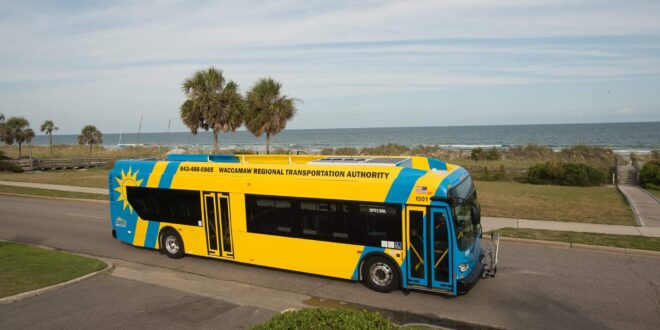By Ruben Lowman
Coast RTA will be undergoing a few changes soon, as the transit authority is also set to receive a few million dollars in federal and state funding.
The transit authority will begin collecting fares from riders again beginning next month, after they altered their policy to allow free rides to help alleviate the financial strain of the COVID-19 pandemic on local residents.
And after receiving nearly $3 million from the federal government’s Build Back Better funding, the transit authority will look to start on several projects they have been planning since before the pandemic. The funds will also help to bolster the annual operating budget of $6.5 million for Coast, said the authority’s CEO Brian Piascik.
Speaking at a Horry County Infrastructure and Regulatory Committee meeting on Tuesday, May 10, Piascik said that the transit authority will begin asking riders to pay the regular fare of $1.50 beginning June 1, with Coast RTA also getting rid of cash transactions on their buses. Piascik said that riders will now have to pay the fee using Apple Pay, Google Pay, Cash App, or an debit or credit card that has a Wi-Fi symbol.
“The big thing is not having to count quarters and dollar bills, reducing the amount of time that passengers spend at the front of the bus, especially on the heels of a pandemic,” Piascik said.
Coast RTA has gradually expanded its service to North Myrtle Beach over the past few years, which was initially difficult due to the effects of the COVID-19 pandemic.
The initial plans were to run a free summer entertainment shuttle that made stops at the city’s major tourist attractions, like Barefoot Landing, alongside their traditional bus services, which had to be shelved because of the pandemic.
With operating expenses and revenue reduced due to making all rides free for customers, it has been a difficult proposition to attempt to expand at the moment. Piascik said these funds, coupled with additional funding he hopes to secure, will enable the transit authority to make significant improvements to the services they offer to residents and visitors of the area.
“This is going to be really good for us,” Piascik said. “[This will] help us to increase the efficiency of our service and start collecting revenue again.”
The new contactless fare system will be phased in so residents without bank accounts can continue to have access to public transportation. Piascik said that Coast will have Visa cash cards that riders can re-fill at retailers such as Walmart. He said that the plans are to eliminate cash altogether once they reach 90 percent ridership, which he expects to be sometime next year. Funding for the new Coast RTA fare system came from Horry County’s allocation of nearly half a million dollars that came from the federal government’s American Rescue Plan.
The transit authority records almost 2,000 riders everyday, with March and February both setting new records for overall ridership. To help keep up with the increased demand for services, Piascik said they will be looking to relocate their headquarters from Conway to a 23-acre facility off Grissom Parkway in Myrtle Beach. That project carries an estimated cost of just under $30 million.
Additionally, Coast RTA also recently announced they have formed a partnership with Sea Haven in Little River to provide immediate help and support to youth in crisis. The local youth crisis center, which is the only one of its kind in the entire county, added the transit authority to its list of Safe Places, a program they run that protects youth going through a difficult time.
Safe Place sites are designated by Sea Haven to help local youth going through crisis find a reassuring place to go, and Coast RTA being added to the program is a vital step. Youth can now get on a bus for free, alert the driver they need assistance and they will be driven to a Safe Place site on the route. The driver will also call a supervisor, who will accompany the youth to the site and report back to Sea Haven.
 North Myrtle Beach Times Serving our Community and the Grand Strand for over 50 years
North Myrtle Beach Times Serving our Community and the Grand Strand for over 50 years

